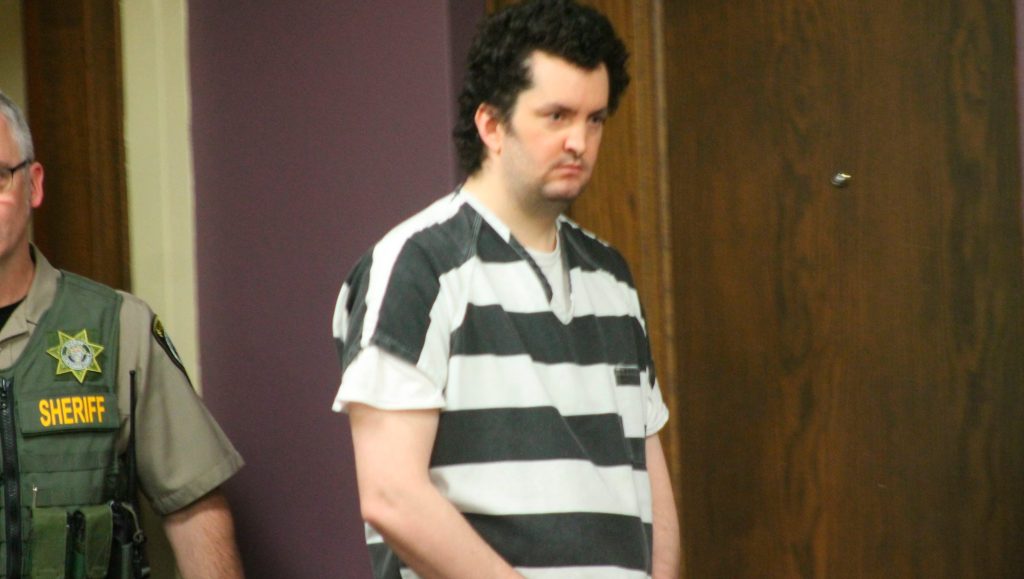On Mother’s Day 2017, the small Oregon town of Estacada was shattered by a crime so gruesome it seemed ripped from a horror film. Inside the Harvest Market Thriftway, shoppers and employees were left frozen in disbelief as a blood-soaked man walked through the front doors, calmly holding a grocery bag containing the severed head of his mother.
That man was 36-year-old Joshua Lee Webb, and what he had done just moments before in his family’s Colton home would leave a lasting scar on the state.

But in July of 2024, seven years after that unthinkable crime, Webb was once again making headlines — this time not for what he did, but for what doctors are now recommending. As reported by the Daily Mail last year, a forensic psychiatrist treating Webb urged the state to release him from the Oregon State Hospital into a lower-security residential treatment facility — a move that has sparked outrage among victims, prosecutors, and members of the public who still remember the horror of that Mother's Day.
The Day That Changed Estacada Forever
It happened on May 14, 2017. Webb murdered his 59-year-old mother, Tina Marie Webb, in their Colton home. He stabbed her multiple times, decapitated her, dismembered her body, and killed the family dog. Then, in a shocking and surreal sequence, he walked to the nearby Harvest Market in Estacada carrying her head in a plastic bag and wielding a large kitchen knife.
Do you love Oregon?
Sign up for monthly emails full of local travel inspiration and fun trip ideas. In each newsletter we'll share upcoming events, new things to do, hot dining spots and great travel ideas.
Store surveillance showed Webb entering the market, calmly grabbing a soda from the cooler, and then—without a word—attacking clerk Mike Wagner with the knife, stabbing him in the side and back. Wagner, incredibly, survived, thanks to quick-thinking coworkers who tackled and restrained Webb until police arrived.
When deputies took him into custody, Webb said chillingly: “I just want to die. I just killed my mom.”
A Descent into Madness
In court and in psychiatric evaluations, Webb was described as deeply mentally ill. Diagnosed with schizophrenia and psychosis, he had long experienced hallucinations and paranoid delusions. In the months before the murder, his condition worsened despite being on antipsychotic medication. He told his girlfriend he believed she was poisoning him. He thought Fox News “owned” him. He claimed a black box in his garage was recording him and that a squid-like creature was latching onto the back of his head.
His mother, Tina, confided to others that Joshua had been “doing weird things lately” and seemed to be “losing his mind.” She and her husband had been trying to care for him at home. Their quiet act of compassion became fatal.
Insanity Plea and Commitment

Webb pleaded guilty except for insanity in 2018. Both prosecution and defense psychiatrists agreed: at the time of the murder, he was suffering from severe psychosis and could not distinguish reality from delusion. He was committed to the Oregon State Hospital in Salem, where he has remained for nearly seven years under psychiatric care.
But in a 2024 hearing before the Oregon Psychiatric Security Review Board, Dr. Karl Mobbs — a forensic psychiatrist who had treated Webb for 18 months — petitioned the board to allow Webb to be transferred to Lifeways McNary Place, a 16-bed residential treatment facility. He argued that Webb had stabilized, complied with treatment, and was no longer a danger to others.
Mobbs said Webb now lives in the hospital’s lowest-security ward and even has privileges to work in the hospital’s greenhouse. “Mr. Webb has been doing well for several years,” Mobbs said. “He accepts the need to take his medication and avoids conflict with other patients.”
But the proposal for Webb’s “conditional release” was met with fierce opposition.
Backlash From Victims and State Officials
The daughter of Mike Wagner, the grocery clerk stabbed by Webb during his rampage, pleaded with the board not to allow the transfer.
“Due to the violent and horrific crimes committed on that day, I just don’t believe justice has been served,” she said. “It’s a terrifying thought to think anyone capable of those actions would be able to be released from any kind of custody.”
Representatives from the Oregon Department of Justice also pushed back. Attorney Elisabeth Warner told the board that Webb showed a “documented lack of empathy” and had failed to adequately express remorse for the brutality of his crimes.
Dr. Mobbs pushed back on that claim, admitting that Webb struggles to articulate empathy but insists it exists. “His ability to express emotion is probably on the lower end of normal,” Mobbs said. “But in private, I’ve spoken to him about the incident, and I believe he does feel remorse.”
Even so, Warner remained firm. “My concern is that removing Mr. Webb from the structure and familiarity of the hospital could lead to more harm than good for everyone involved in this case.”
Clackamas County prosecutors agreed. First Assistant DA Scott Healey said, “This individual shouldn’t be released on any type of conditional release at this time.” He described the level of violence as “extraordinary” and emphasized the lingering trauma among victims and the public.
No Clear Answers — Only Fear and Memory
What makes Webb’s case so unnerving is the extreme nature of the crime. This wasn’t a momentary outburst or heat-of-the-moment act. This was methodical, prolonged, and disturbingly public. Webb admitted to murdering his mother, decapitating her, dismembering her body, killing his dog, and then stabbing a stranger in a grocery store. He gave no clear motive, only a trail of blood and silence.

As of April 2025, the board has not granted the transfer, and Webb remains at the Oregon State Hospital. But the fact that it was even proposed has left many wondering: how do we balance compassion for the mentally ill with justice for victims? How do we protect the public while offering treatment to someone who, by all accounts, was deeply unwell when he committed one of Oregon’s most horrifying crimes?
These questions don’t come with easy answers. What’s clear is that the community hasn’t forgotten. And for those in Estacada, Mother’s Day has never felt the same since that terrifying Sunday in 2017 — when horror walked through the front door of a grocery store and never truly left.













